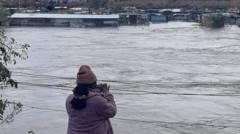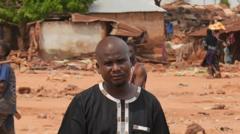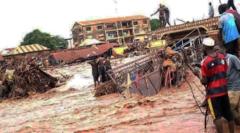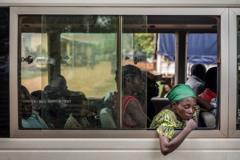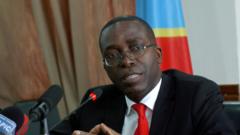At least 33 fatalities have been reported as relentless rains cause severe flooding in Kinshasa, prompting President Tshisekedi to assure support to the affected population. Many neighborhoods have been devastated, and local authorities are under scrutiny for their response amidst ongoing climate-related challenges.
Devastating Floods Claim Lives in Kinshasa Amid Climate Crisis

Devastating Floods Claim Lives in Kinshasa Amid Climate Crisis
The death toll rises as torrential rains wreak havoc in the capital of the Democratic Republic of Congo, with residents facing dire conditions.
Following an intense storm, the already vulnerable city of Kinshasa, the capital of the Democratic Republic of Congo, is reeling from catastrophic flooding that has resulted in at least 33 deaths. Officials have communicated a sense of urgency as President Félix Tshisekedi convened a crisis meeting to address the disaster and provide necessary aid to residents.
Desperate citizens have resorted to swimming, wading, or using makeshift canoes to escape the rising waters. Kinshasa, which is home to approximately 17 million people and situated along the Congo River—one of the largest rivers in the world—has a history of flooding, particularly as the river recently reached levels not seen in 60 years. With parts of the city experiencing erosion, there have been growing concerns regarding how climate change is exacerbating flooding conditions.
Recent reports indicate that nearly half of Kinshasa’s 26 districts have been impacted, with the highest concentration of damage in impoverished communities on the outskirts. “The water has reached heights of 1.5 meters,” remarked local resident Christophe Bola from the Ndanu district. Many residents express frustration with the government’s slow response and lack of support during the crisis.
As the floods continue, a widespread water shortage has emerged, following the inundation of critical water treatment facilities. Furthermore, major roadways linking the city center to the international airport and the primary port of Matadi remain obstructed, complicating evacuation efforts. One of the tributaries of the Congo River, the N'djili River, has overflowed its banks, trapping numerous residents and only highlighting the poor sewage management and urban planning issues plaguing Kinshasa.
Attention is being drawn to the government’s previous announcements aimed at improving drainage systems, yet tangible improvements remain to be seen in the aftermath of this disaster. The national meteorological agency has warned of more heavy rainfall expected in the coming weeks, threatening to worsen the situation not only in Kinshasa but also in the eastern city of Goma which has recently faced conflict.
As the people of Kinshasa grapple with the impact of the floods, the long-term implications of climate-related disasters loom large over the populace, emphasizing a critical need for effective intervention and planning.





